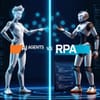Artificial Intelligence (AI) agents and Robotic Process Automation (RPA) are two distinct technologies that serve different purposes in business automation. While RPA excels in automating repetitive, rule-based tasks with structured data, AI agents offer adaptive, intelligent automation capable of handling unstructured data, making decisions, and continuously learning from context.
RPA is ideal for tasks that require precision and consistency, such as data entry, invoice processing, and HR operations. It's designed to execute specific instructions with minimal errors, making it a valuable tool for streamlining mundane processes. However, RPA lacks the ability to adapt to new scenarios or process unstructured data like emails or images.
On the other hand, AI agents leverage technologies like machine learning, natural language processing, and computer vision to perform complex tasks. They're designed to mimic human intelligence, capable of learning, adapting, and making decisions based on data and context. AI agents are better suited for tasks that require flexibility and cognitive skills, such as customer service, fraud detection, and predictive maintenance.


